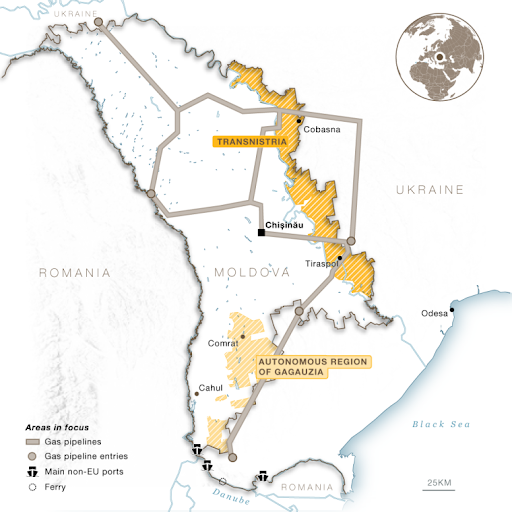Trailing behind these two frontrunners in the race are several other candidates, including two former prime ministers, a former deputy prime minister, the former head of the pro-Russian Gagauzia region, and a well-known journalist.
In the context of the upcoming Moldovan elections, the regions of Gagauzia and Transnistria play crucial roles in shaping the political landscape. Gagauzia, a predominantly pro-Russian autonomous region, has been increasingly vocal against Chisinau’s pivot towards the European Union.
Recent tensions escalated after the election of Evghenia Gutsul as başkan (governor), who is aligned with the pro-Russian party of fugitive oligarch Ilan Shor. Gutsul’s administration openly criticized Moldova’s European aspirations and threatened secession if Moldova pursued integration with the EU. Meanwhile, Transnistria, a breakaway region, sought to distance itself from the ongoing conflict in Ukraine, demonstrating a desire to maintain stability amid geopolitical tensions.
There is uncertainty regarding the participation of these regions in the elections however. Currently, it appears that residents of Gagauzia and Transnistria may not be able to vote, as the Moldovan authorities typically do not include these areas in national elections. The exclusion of these regions could significantly impact voter turnout and the overall political dynamics, particularly given the local pro-Russian sentiments.
Expected voter turnout for Moldova’s upcoming election is anticipated to be robust, fueled by significant enthusiasm among the electorate. A recent poll conducted by IRI indicates that approximately 75% of respondents are eager to participate in the electoral process. This strong interest suggests that voters are not only aware of the importance of the election but are also motivated by the chance to influence Moldova’s direction regarding its European Union membership bid.
A referendum on EU integration will accompany the election, providing voters with the opportunity to voice their aspirations.
Hungary’s veto on EU enlargement in 2023 complicated matters significantly, but after pressure from other leaders, Prime Minister Viktor Orbán dropped the veto on Moldova’s EU aspirations. Some analysts speculate that Orbán’s obstructionist tactics are designed to maintain Russian influence in Eastern Europe.
The implications of the upcoming election extend far beyond national borders. Should Sandu secure victory and successfully navigate the EU accession process, it could mark a turning point in Moldova’s geopolitical standing — solidifying its orientation towards the West. Conversely, a victory for pro-Russian candidates could result in a far different path for Moldova, where ties with the EU are weakened and Moscow’s influence is emboldened.
Source link : https://www.irinsider.org/home/3xnp2gpxqex6m8x412ufl3b7shpz63-2f29s-6bpp4-4gj88-x3x2m-rtj9w-r3xt9-t8zep
Author :
Publish date : 2024-09-30 07:00:00
Copyright for syndicated content belongs to the linked Source.
